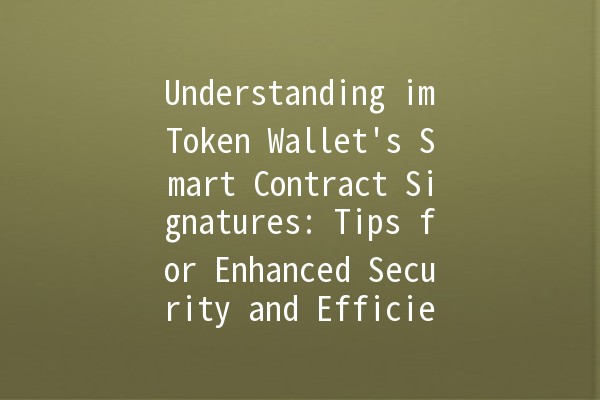In the evolving landscape of digital finance, smart contracts represent a revolutionary approach to automate transactions and agreements. ImToken, one of the leading digital wallets, has integrated smart contract functionality, allowing users to execute a variety of blockchainbased transactions with ease. This article aims to delve deep into the world of imToken wallet smart contract signatures, offering practical tips and techniques to enhance your experience while maintaining security.
Smart contract signatures serve as a digital stamp of approval, confirming the authenticity of a contract and the identity of the parties involved. Within the imToken wallet, these signatures ensure that transactions are carried out as intended, minimizing the risks associated with fraud or unauthorized access.
Before diving into practical tips, it's important to grasp the fundamental concepts of smart contracts and how they function within the imToken ecosystem. Smart contracts are selfexecuting contracts with the terms of the agreement directly written into code. When deployed, these contracts automatically enforce and execute the terms, provided certain conditions are met.
A smart contract signature is generated when a user interacts with a contract, providing a unique identifier that links them to their digital assets securely. In imToken, this process involves cryptographic techniques that ensure the integrity and authenticity of the transaction.

Before you engage with any smart contract, it's crucial to verify the contract address. Scammers often use similar addresses to trick users. To ensure safety:
Use Trusted Sources: Always confirm addresses through official channels, like the imToken website or authorized partners.
CrossCheck Transactions: Utilize blockchain explorers to verify contract details.
Example: Before sending funds to a decentralized application (DApp), crossreference the address with a reputable source to confirm its authenticity.
Multisignature (multisig) wallets require multiple signatures to authorize a transaction. This adds an extra layer of security. When using imToken:
Set Up MultiSig: Configure your wallet to employ multisig for sensitive transactions.
Define Signers Carefully: Choose trusted individuals who will cosign the transactions with you.
Example: If you are part of a decentralized organization, establishing multisig can prevent any single individual from making significant transactions without consensus.
Your private key is the backbone of your wallet's security. Losing it can result in the forfeiture of your assets. To ensure your keys remain secure:
Use Hardware Wallets: Store your private keys in hardware wallets offline.
Avoid Sharing: Never share your private keys, mnemonic phrases, or passwords with anyone.
Example: Implement a twofactor authentication system for added protection when accessing your wallet.
The blockchain space is continually evolving, with new vulnerabilities emerging regularly. Staying informed can protect your assets. To stay updated:
Follow The Community: Engage with the imToken community on forums or social media to learn about potential risks.
Read Security Reports: Regularly review security audits and reports concerning the smart contracts you interact with.
Example: If a new vulnerability is discovered in a widely used DApp, temporarily halt transactions until the developers provide a patch.
Every smart contract interaction requires gas fees. Knowledge of these fees enhances transaction efficiency:
Monitor Gas Prices: Use tools to track realtime gas prices to ensure you’re not overpaying.
Optimize Transaction Timing: Conduct transactions during offpeak hours when gas costs are lower.
Example: Rather than executing transactions on weekends when fees are high, plan your activities for weekdays when they may be cheaper.
ImToken employs a range of security measures including multisignature support, hardware wallet integration, and a robust encryption strategy. Users can also assess the security protocols of each smart contract they interact with through dedicated auditing processes.
If you lose access to your imToken wallet, recovery hinges on having your mnemonic phrase. Inputting this seed phrase in a fresh installation of the imToken app will allow you to restore your wallet securely.
Generally, most smart contracts are immutable once deployed, meaning they cannot be changed. However, developers can build upgradeable contracts, allowing for modifications under specific conditions.
While smart contracts enhance transaction efficiency, risks include coding errors, lack of proper auditing, and potential exploits. Users should conduct thorough research and only interact with wellreviewed contracts to mitigate these risks.
Always download the latest version of imToken from the official website or trusted app stores. Verify version updates through official channels and read community feedback to ensure you’re on the right track.
Limitations may include compatibility with specific tokens or DApps, as well as network congestion affecting transaction speeds. Always check the network status and compatibility before proceeding.
As digital wallets like imToken continue to innovate, understanding the intricacies of smart contract signatures becomes essential for users aiming to maximize security and transactional efficiency. By employing the practical tips discussed and staying informed about emerging trends and vulnerabilities, you can greatly enhance your experience in the digital finance realm. Embrace these tools and strategies to navigate the world of smart contracts effectively!